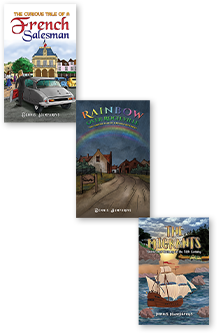
Musicals
Growing up in the 50s and 60s, I showed little interests in
musicals. Before rock ‘n’ roll took off, I listened to Bing Crosby, Frankie
Vaughan, and various crooners. Skiffle showed itself and soon seemed to vanish.
Then came Elvis and a host of US pop singers, like Pat Boone, Paul Anka, Roy
Orbison, Neil Sedaka, Brenda Lee, and Connie Francis. Not forgetting the
British efforts, especially by Cliff and the Shadows.
There was the explosion in popular music with the Beatles, the Stones and too
many fab groups to mention here. The world had changed for ever, or had it? In
those days musicals for me were a thing of the past. The wonderful West Side
Story and My Fair Lady just passed me by. (I have caught up with them since.)
When I saw the long cinema queues of middle-aged and older people for the Sound
of Music, I was perplexed. I did not want to see that film, as I regarded the
brilliant Julie Andrews as about as uncool as you can be. I cannot watch the
film now without being moved, especially when Maria dances the ländler with the
Captain and is obviously in love with him. Wow!
I was impelled to write this blog having seen two recent programmes on BBC 4
about Andrew Lloyd-Webber. The name was familiar to me in the 1960s as I had
played a flute piece by Professor William Lloyd-Webber, Andrew’s father. So
this young British musician had decided to write musicals in the swinging 60s.
He certainly was not jumping on some bandwagon but was doing something which he
really loved and believed in. It seems that he is one of those brave and
wonderful people who have spent their time doing what they love best.
The programmes brought to light the boldness and originality of his themes,
e.g. politics in Argentina; actresses in cat costumes singing on stage; singing
and dancing on roller skates at high speed; a risky musical about Jesus Christ
and one about a phantom in the Paris opera house, plus many other hit shows.
I have recently discovered André Rieu, whose singers often perform Lloyd-Webber
numbers to big audiences and to great effect.
A good feature of musicals is that you can hear the words of the songs, unlike
some other musical genres. Lloyd-Webber also knows how to compose songs which
actors, who are not primarily singers, can sing really well. He also writes
more demanding song for those with operatic skills.
It is not right to talk of musicals without mentioning John Wilson and his
orchestra, who has been such a success at the Proms in recent years, playing
numbers from the great musicals. He has been responsible for reviving
some of them, as the orchestral scores were lost and he had to recreate them by
listening fastidiously to old recordings.
So now I see musicals as an important part of the overall musical canon, along
with classical and popular music.
Post Views : 107